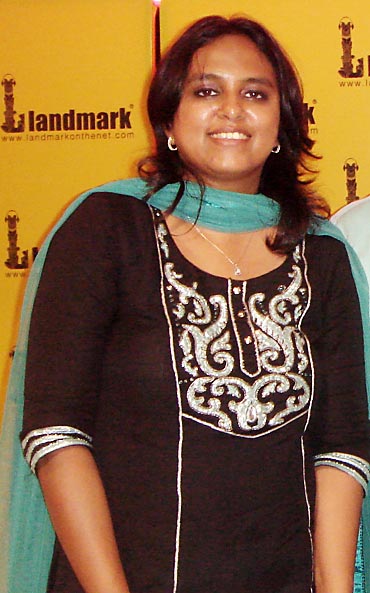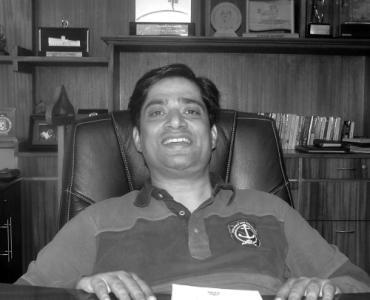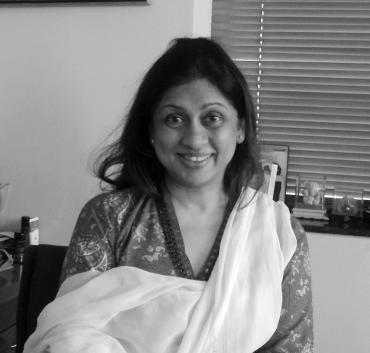
Author Rashmi Bansal seems to have a way with entrepreneurs.
In her first book Stay Hungry Stay Foolish she profiled 25 IIM-Ahmedabad grads, dividing them into three categories (The Believers, The Opportunists and The Alternate Vision). Her second book, Connect The Dots, also looks at entrepreneur via three categories: Jugaad, Junoon and Zubaan.
This time around Rashmi has stayed away from MBA entrepreneurs. Connect The Dots focuses on entrepreneurs who rose up the ranks and proved their mettle, without the baggage of a fancy management degrees.
Today, in the first of a three-part series, we meet two entrepreneurs in the Jugaad (adjustment) category, who had no formal training in business. They learnt by observation, experimentation and application of mind.
Kunwer Sachdev, maker of Su-Kam inverters, hated physics and maths but went on to become the managing director of a Rs 500 crore company that lives and breathes electronics and inverters.
Sunita Ramnathkar of Fem Care Pharma took on multinational fairness brands and spun her company into a Rs 100 crore venture and recently sold out to Dabur.
Excerpts from the book Connect the Dots by Rashmi Bansal published by Eklavya Foundation, Rs 150'.

There are people who do well in school and go on to become engineers. There are people who bumble through and one day become inventors.
Kunwer Sachdev is the guy who hated Physics, hated Maths but today he lives and breathes electronics and inverters. The Su--kam R&D Centre looks like an office designed for cubicle workers but it's actually the karambhoomi of inventor--engineers.
Just like Kunwer himself. Although when you first meet the man you can't help wondering, "Is this short, boyish looking fellow really the MD of a Rs 500 crore company?"
I think Kunwer can sense my thoughts because there is mischief in his eyes as he greets me. "Tell me why do you want to write about me... You should look at someone big and famous like Ratan Tata."
I explain the purpose of my book -- to inspire, to educate, to guide the next generation of entrepreneurs. Lagta hai thoda maska lagana padega, ki aap bhi famous hain, I think to myself.
But he breaks into a grin. "You are so much like me! We are both a little crazy, jo hamein karna hai wahi karte hain. See -- you have so many points to convince me. You will write your book one way or another."
Just like he built this company. Excerpts.
While in school young Kunwer would often have to wake up early and open up his father's grocery store because the helper had not arrived. Eggs and bread are perishables -- you don't have a choice!
Meanwhile his elder brother had started a small business and there too, Kunwer lent a helping hand.
"My brother used to go on a cycle to sell pens -- I went along. Even if I used to get a rupee or two rupees, it was a great feeling."
After class 12, Kunwer continued to work with his brother, but he also joined Hindu college and this was a 'big leap'. An experience which changed his personality completely.
"I came from a school where we spoke in Hindi, at Hindu college, everyone spoke in English In the first year of college, I was very shy. I never talked with anyone... I did not know whether I will be able to do it or not."
Then somebody suggested to Kunwer: "Read novels to improve your English." He recalls, the first book he ever picked up was a 'big book, about an architect'. The Fountainhead by Ayn Rand.
"For one week, I just looked at the book and thought that I won't be able to do it. Finally I started reading it and in the first year of my life I read around 30 English novels. I overcame my language problems, started talking to people and made friends in college."
What's more, by final year Kunwer was one of the 'most sought after guys' in the college. He was into student politics and also on the organising committee of the Hindu college cultural festival 'Mecca'.
"Every year students collected funds for the festival. The record was one lakh rupees -- we collected five lakhs that year! We spent Rs 3 lakhs and gave Rs 2 lakhs for the 'next generation'," he recalls with a flourish.
As far as 'studies' went, well again, that was really not a priority for Kunwer.
"I enrolled for BA in Mathematical Statistics (Hons) and I passed every year -- simply because I did not want to be a failure. But I never studied with my heart because I used to feel -- what's the use of these theorems?" The important stuff was what he learnt outside the classroom.
"I learnt how to talk to people, to take people along and how to make groups. I learnt to organise things. My height was a big problem... because I was short people used to think what will this child do? But when I was challenged, I used to think that I will do and show them. So I kept on taking challenges in life and I set one or two big goals for myself."
The main one being to 'make it big in business'.
In 1984, Kunwer graduated from college and joined his brothers. He coined the name 'Su--Kam' for the pens and wanted to make it into a 'brand'.
"I used to talk big and that worried my family... Ki badi badi baatein karta hai." Should one dare to dream, or simply accept the reality and aim within arm's reach? That, is a personal choice. Kunwer's dreams kept him awake while his brother was satisfied with his small shop and slept soundly at night.
"After college, I joined my brother but I had a tough time because his thoughts were different from mine. What he wanted to do in life, I did not want to do that. He wanted to hold on to what he had made -- that was it."
By that time he had 'settled' down and owned two shops. "You run this shop and I will run that shop," was the offer but it did not excite Kunwer at all.
"We were making money but I wanted to build a brand. I remember at that time, Luxor was a brand, owned by one Mr D K Jain. I wanted to go and sit in that seat of Mr D K Jain. But my brother was not interested in branding... He was not convinced we would be able to sell."
For a while, Kunwer soldiered on. But after two and half years, he realised: "I can't work with him." This created major tension in the family. The question was, what will this boy do on his own?
"For a few days, I sat at home and then I decided that I am not going to do anything in pens." A lesser man might have stuck to pens -- the only business he knew. But Kunwer did not want to compete with his brother. And that was that.

You work hard so you can have a beautiful house, car, servants, every comfort in life. But what if you already have all this -- then what?
Well, if you are a housewife who is a little crazy and has that itch to 'do something', you start a business. If you are lucky and have a brother who is equally crazy, you rope him in and 25 years later you have a Rs 100 crore company.
That's the story behind Fem -- a 'made in India and for India' cosmetics company which battled multinational brands and held its own. Just how did they do it?
To find out, I meet Sunita Ramnathkar at her very functional and modest office in Nariman Point. The feeling you get when you are with her is -- she is so alive. Sunita's eyes twinkle, she laughs with abandon, she relives the excitement of demonstrating Fem bleach for the first time -- like it happened yesterday.
Sunita's zest for life is infectious. Her understanding of what women want -- and what sells -- razor sharp. Couple that with the logical and technical genius of her brother Sunil Pophale -- an aeronautical engineer from IIT -- and you can see how Fem has given the biggest brands in the marketplace a run for their money.
Fem is also the story of a woman who built a career for herself, at a time when women did not have careers. A woman who gave birth to a little girl -- and to a company -- in a span of six months. And did a great job of bringing both babies up. Excerpts.
Because she never said: "I am just a housewife."
Because she never said: "I am trapped."
Because she said: "I can dream and make my dreams come true."
As can anyone, anywhere, any time they decide to...
It was a well to do family. Huge, airy flat at Marine Drive. Servants, driver, cook -- no need to do anything. A dream come true for almost any young girl -- but not Sunita.
"I started feeling quite useless, because there were people to take care of just about everything. I was restless -- I wanted to do something."
A beautiful baby girl was born, in 1979. But even that did not cure the 'doing' itch. A job could have been an option but did not excite Sunita. She had this vague notion about doing something 'for Indian women'. That something was the idea of cream bleach.
"At that time there was no cream bleach available in the market. People used bleaching powder with liquid hydrogen peroxide and liquid ammonia, and this whole concoction burnt the face."
But use they did -- because something had to be done about ugly facial hair...
And how did Sunita stumble upon this opportunity?
"I just found what I would have liked to use, which was not available."
Any products she explored, apart from bleach?
"Actually, it was only bleach. Nothing else!" she laughs. "And I went after it with a vengeance."
It could have become a small business, run by a housewife for a bit of fun and some pocket money. But fate had other things in store.
"My brother Sunil was just graduating from IIT Powai. He was an aeronautical engineer and knew nothing about cosmetics, let alone bleach. But I told him, here is an idea -- why don't you have a look?"
At the time, Sunil was working with Air India in the COD department. Six months into the job, he was bored and disillusioned. Not just with Air India but the aeronautical industry as a whole.
"When I graduated I came to know that the aircraft industry is not as exciting as it might seem. Boeing, for example -- has its own maintenance manual. As an engineer I would be conducting non--invasive testing procedures. As your experience grows, your ability to certify goes up and that's how you progress."
Not exactly challenging -- or creative. IIT seniors were already frustrated.
"I too had an offer from Boeing but they wanted me to start right away, and work on a visitor's visa which I refused."
So Sunil too was looking out for 'something to do'; exploring various projects.
"At that time powdered metallurgy caught my fancy. The automobile industry in India was so far behind that I could sense, in the near future, we'll have lot of catching up to do. And then there will be tremendous spurt in demand for powdered metallurgy products."
Powdered metallurgy certainly sounds more worthy of an IIT graduate's technical skills than cream bleach -- but Sunil had no such hang--ups. When Sunita suggested he look at her idea he thought, why not.
The metallurgy project was complicated, capital intensive and linked to the success of the auto industry. The bleach project was relatively simple, required little capital and was consumer oriented. Most importantly, it served a need which was not being met.
"I literally forced this idea of bleach down his throat." is how Sunita remembers it but it was really a rational decision for Sunil. One that 'made sense'.
Well, that's how he saw it although an IIT engineer spending the next two years of his life formulating cream bleach did not make sense -- to anyone else. Including the family.
"My father found it ridiculous. He said, 'What malham are you trying out'?"
And yet, he supported them -- simply by not interfering or questioning. Just letting them be.
"When Sunil said he wanted to do something on his own, my father never said no, you have to go and do a job. Or that you are an IITian, you have to earn at least so much."
Perhaps he was simply too busy to get too involved, but ultimately it was about trust. "I trust you know what you are doing... go on."
Brother and sister did know what they were doing -- but not how.
There was one cream bleach in the market by the brand name Jolen.
It was smuggled into the country and retailed for the princely sum of Rs 400. But surely there would be many more takers for a locally made product -- equally good -- but at a better price.
The question was -- how to make it happen?